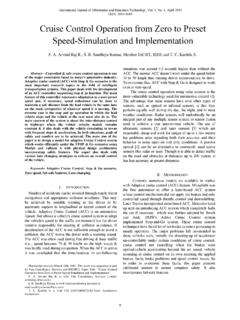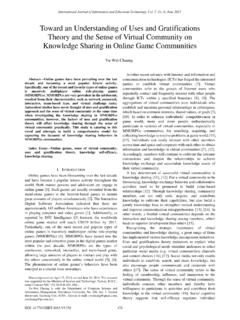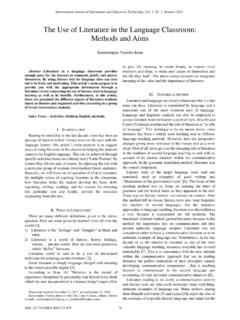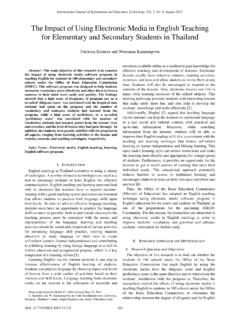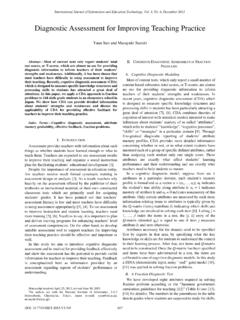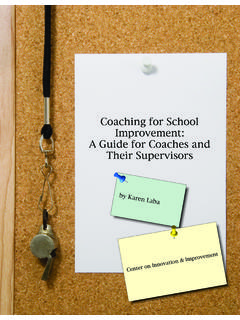Transcription of The Development of Peer Coaching Skills in Primary School ...
1 Abstract This paper reviews the Development of peer Coaching in Primary schools with a focus on how children respond to feedback. Research shows that feedback can play a powerful part in children s learning but it is less clear why some children respond well to feedback whilst others may not. The objective of this research was to explore how Primary School children respond to feedback and what influences their decisions to act on feedback received. Thematic Analysis is used to explore how 28 Primary School children (10-11 year-olds) responded to feedback following a peer Coaching activity. Findings suggest that a positive response to feedback was associated with: feeling valued and building on strengths; verbal feedback being preferable to written feedback; specific feedback being most helpful with; and being able to understand the feedback provided.
2 Index Terms Coaching , feedback, Primary schools, children, thematic analysis. I. INTRODUCTION Research shows that feedback can play a powerful part in children s learning [1] but what is less clear is why some children respond well to feedback whilst others may not. This research builds on previous research by Briggs and van Nieuwerburgh [2] who found that the quality of feedback did not seem to influence children s uptake of the suggestions made. Briggs and van Nieuwerburgh questioned whether attitudes towards receiving feedback may have more of a correlation than the quality of the feedback itself. In this research, contrary to the findings of Briggs and van Nieuwerburgh, the majority of children did accept and act upon the feedback provided. II. LITERATURE REVIEW A. Coaching and Feedback Although Coaching has become increasingly popular in secondary schools for staff and student Development , [3]-[5] it is still comparatively rare in Primary schools (especially peer to peer Coaching ) because young children are perceived as lacking the maturity to deal with Coaching activities.
3 This research provides an opportunity to further develop this area. Some of the main Skills of Coaching are: listening, asking open questions, clarifying and encouraging reflection. Giving and receiving feedback is generally agreed to be one of the key elements related to encouraging reflection [ 6 ], [7]. Manuscript received November 10, 2013; revised January 22, 2014. Linda Dorrington is with the University of East London, United Kingdom (e-mail: Effective coaches reinforce positive beliefs and provide challenge to limiting beliefs. Feedback is considered to be a fundamental part of this task [8]. B. What Makes Coaching Successful? One of the most consistently identifiable factors seen as contributing to the success of Coaching is the quality of the relationship between the coach and individual client [9]-[11].)
4 Motivation to learn was identified as one of the most critical factors influencing learning effectiveness by [12]. This point to the complex relationship between the coach and the coachee and the inter-relationship between trust, rapport, commitment and motivation in determining how effective Coaching is. It is important for us to consider these in exploring how children respond to feedback. C. Coaching in Education Coaching in education has gained considerable momentum over the past 10 years. To date, however, it has been focused more within secondary or further education, being used for staff Development /performance, time management, student attainment and reducing anxiety [13]-[15]. Coaching has shown significant increases in levels of cognitive hardiness and hope in students [16]; enhancing students emotional intelligence; increasing their mental toughness; improving students attitudes and hope for the future [17].
5 Coaching has a beneficial impact however, not only on those being coached, but on the coaches. Secondary School students trained as coaches reported increased emotional intelligence [18] as well as improved communication Skills and more positive attitudes to learning. D. Coaching in Primary Schools Coaching in Primary schools, comparatively rare until recently, is now gaining momentum although still focused on staff Development . There is a lack of research in the use of Coaching with pupils but what has been done shows value, in particular the use of feedback which suggests that more research into this area may be of real importance in raising attainment and increasing motivation in schools. Research carried out by Madden, Green, and Grant (2011) found that the use of solution focused Coaching helped Primary School children in identifying their own strengths and resources with significant improvements in enhancing engagement in learning as well as their sense of hope and wellbeing [19].
6 This links with and supports the importance of motivation as a key factor in learning and engaging with Coaching which is identified as one of the most critical factors influencing learning effectiveness. Vlach and Carver (2008) revealed that children who received observation Coaching had significantly greater improvements in drawing scores The Development of Peer Coaching Skills in Primary School Children: An Exploration of How Children Respond to Feedback Linda Dorrington and Christian van Nieuwerburgh 50 DOI: Journal of Information and Education Technology, Vol. 5, No. 1, January 2015 than children who did not receive Coaching [20]. E. Feedback The generic stages of Coaching consist of contracting, relationship building, assessment, feedback and reflection, goal setting and implementation [21]. Feedback is considered to be a fundamental part of this task.
7 Hattie (2009) suggests feedback is one of the most significant factors in determining what impacts on learning, with the potential for a profound effect. However, not all feedback is effective [22]. Feedback needs to be timely; address the current task; specify next steps and how to get here; provide accurate feedback and be given in an atmosphere of trust [23]. Questions such as where am I going? and how do I get there? and where to next? were found to have powerful effects on learning. In his research on visible learning Hattie (2009) suggested that teachers need to provide direction and re-direction to ensure that content is understood, thereby maximizing the power of feedback as well as a commitment to further challenge. This is of particular importance when considering the effectiveness of peer Coaching in the classroom.
8 F. Peer Feedback Whilst there is much support for the use of feedback to support training and raise attainment, there are conflicting views on the use of peer feedback. Bergen et al. (2000) support the use of peer feedback as collaborative and supportive, leading to professional Development [24]. Nuthall (2007) however, questions how accurate this support actually is, especially in relation to children, suggesting that 80% of feedback received in a given day is from another student and 80% of this is wrong, which is a strong indicator of the need to improve the accuracy of peer feedback [25]. He highlights the need to ensure that students have the necessary background knowledge to understand the learning tasks and the need to be actively engaged with the information. Another question which may cause some discomfort is that of challenge and whether peers (especially children) feel able/comfortable challenging each other [26].
9 Critics of peer feedback Connor and Asenavage (1994) suggest it is less effective than teacher feedback on students writing as they may not take it as seriously [27]. There is also the concern about the quality of peer feedback, as some students lack the ability to give peer feedback owing to insufficient knowledge. This could be challenged by the method used in Peer-Mediated Instruction (PMI) an approach in special education where peers of the target students are trained to provide necessary tutoring [28]. The teacher provides on-going feedback, watching the peer at all times while the intervention is being used. In replicating the tasks used in the research carried out by Briggs and Nieuwerburgh (2010), this research aims to extend the knowledge of what makes children engage with and respond to feedback.
10 III. METHODS The initial decision was made to use qualitative rather than quantitative research methods on the grounds that the aim was to understand the thinking process of children. A qualitative approach would allow the researchers to focus on depth and texture, trying to understand the participants experiences and how they engage with feedback. A. Thematic Analysis (TA) Thematic Analysis was chosen on the basis that it provides a flexible research tool with the potential to collect rich, detailed data. It is a method for identifying, analyzing and reporting patterns (themes) within data. It allowed the researchers to organize and describe data in considerable detail and to interpret various aspects of the research topic [29]. B. Stages of Research The participants were a mixed group of 28 Primary School children (ages 10-11) who worked in friendship pairs for the feedback tasks.

